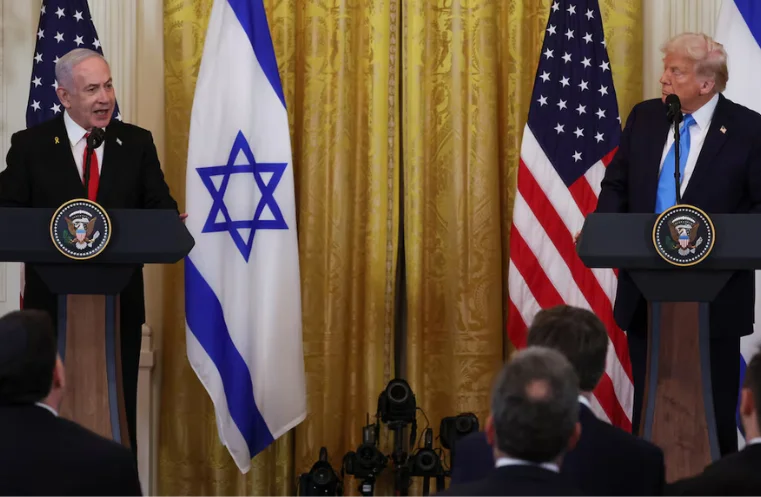Islamabad, Feb 5: Former U.S. President Donald Trump has proposed a dramatic shift in American foreign policy by suggesting that the United States take control of the war-ravaged Gaza Strip. His plan includes resettling Palestinians elsewhere and developing the region economically, a move that contradicts long-standing U.S. and international policies on the Israeli-Palestinian conflict.
During a press conference with Israeli Prime Minister Benjamin Netanyahu, Trump unveiled this unexpected proposal without providing specific details. He also advocated for the permanent relocation of over two million Palestinians to neighboring countries, referring to Gaza as a “demolition site” due to the ongoing destruction from the Israel-Hamas conflict.
Trump’s idea has sparked significant controversy, with both allies and critics questioning its feasibility. A U.S. takeover of Gaza would challenge international diplomatic norms, particularly as Washington has historically supported the idea of Gaza being part of a future Palestinian state alongside the West Bank.
“We will take over Gaza, clear the dangerous remnants of war, and transform it into a thriving region,” Trump stated. He envisioned the strip becoming an economic hub, potentially dubbed “The Riviera of the Middle East.” However, he did not clarify how the U.S. would assume control or under what legal framework this could be achieved.
Trump’s proposal has drawn sharp criticism from Democratic lawmakers and global leaders. The Saudi government reiterated its opposition to any forced displacement of Palestinians and reaffirmed its stance that normalization with Israel is contingent on the establishment of a Palestinian state. Senior Hamas officials also condemned the plan, warning of increased instability in the region.
Read More:
GCC Residents Can Now Perform Umrah Using Tourist and Transit Visas
Analysts believe Trump’s bold statements may be strategic, serving as an extreme opening stance for future negotiations. Throughout his first term, Trump often made dramatic foreign policy pronouncements, some of which were never implemented. Experts also compare this proposal to past U.S. interventions in Iraq and Afghanistan, cautioning against another prolonged military commitment.
Additionally, a United Nations report estimates that clearing Gaza’s rubble could take over two decades and cost more than $1.2 billion, further complicating Trump’s vision for redevelopment. Meanwhile, Netanyahu remained noncommittal, praising Trump’s innovative approach but refraining from fully endorsing the plan.
While Trump’s rhetoric projects an ambitious transformation, questions remain about its practical execution. With ongoing ceasefire negotiations and international opposition to forced displacement, the fate of Gaza continues to be a critical issue in Middle Eastern geopolitics.
